Imagine the soft, delicate glow of morning light as you gaze into the mirror, noticing the subtle changes in your skin after pregnancy. You're ready to nurture it back to its pre-pregnancy vitality, but where do you start? Initially, you'll need to assess your skin's current condition, as it's likely more sensitive and possibly a bit unpredictable. Opting for gentle, hydrating products can set a solid foundation for your new routine. Curious about which ingredients to embrace and which to avoid? I'll guide you through selecting the safest, most effective products for this new chapter in your skincare journey.
Key Takeaways
- Consult a dermatologist to tailor a skincare plan specific to your post-pregnancy needs and skin type.
- Start with a gentle cleanser and hydrating moisturizer to maintain skin balance and prevent dryness.
- Incorporate key ingredients like hyaluronic acid, vitamin C, and peptides to enhance hydration, brightness, and elasticity.
- Use a broad-spectrum SPF 30 sunscreen daily to protect against hyperpigmentation and sun damage.
- Keep the routine simple and soothing, focusing on hydration and using minimal, multipurpose products.
Understanding Post-Pregnancy Skin
Navigating the changes in your skin after pregnancy is crucial for effective care and rejuvenation. Hormonal shifts during and after pregnancy can significantly alter your skin's texture, elasticity, and overall appearance. Understanding these changes is the first step toward addressing them effectively and safely.
During pregnancy, increased levels of hormones such as estrogen and progesterone can cause your skin to become more sensitive and prone to issues like hyperpigmentation and stretch marks.
Post-pregnancy, as hormone levels adjust back to normal, you might notice dryness, a decrease in skin firmness, or even a new sensitivity to previously used products.
It's essential to approach your skincare with a gentle mindset. Opt for products that are free from harsh chemicals and are designed to support skin healing and nourishment.
Ingredients like hyaluronic acid for hydration, vitamin C for brightening, and peptides for elasticity can be beneficial.
Remember, your skin's needs can shift during this time, so it's important to be observant and responsive to its changing conditions.
Adapting your skincare routine to these new needs not only helps restore your skin but also enhances your overall well-being during this transformative phase of life.
Be patient and attentive, and your skin will show its gratitude through its radiant and revitalized appearance.
Consult Your Dermatologist
Before adjusting your skincare routine post-pregnancy, it's crucial to consult with a dermatologist. This step ensures you receive personalized advice tailored to your skin's unique needs during this delicate time.
Dermatologists specialize in skin health and can provide valuable insights and recommendations that safeguard your wellbeing while enhancing your skin's appearance.
Here are key reasons to schedule a skincare consultation post-pregnancy:
- Personalized Care: Receive a skincare plan that addresses your specific concerns and skin type.
- Safety: Ensure all products and treatments are safe, especially if you're breastfeeding.
- Effectiveness: Get professional guidance on the most effective products and treatments for post-pregnancy skin issues.
- Preventive Measures: Learn about preventive strategies to protect and maintain your skin's health in the long term.
During the consultation, be open about your skincare goals and any issues you've noticed.
Your dermatologist's recommendations will be based on a detailed understanding of your skin's condition and history.
Prioritize Hydration
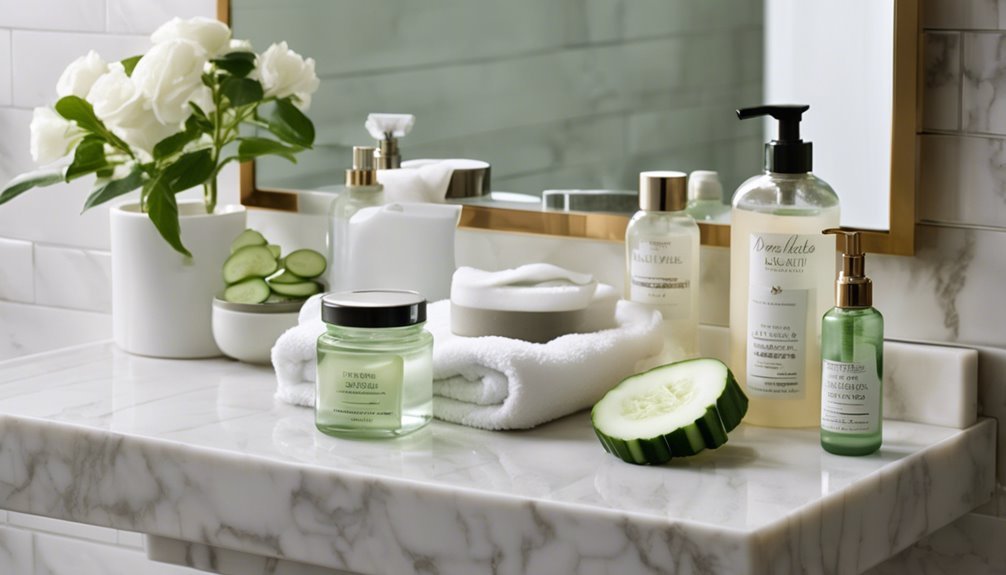
Hydration is essential in restoring your skin's balance and vitality after pregnancy. Post-partum, your body is recuperating from hormonal changes, and your skin needs extra TLC to regain its glow. Hydration benefits your skin by enhancing its elasticity and reducing the appearance of fine lines, which may be more pronounced after the stress and stretching of pregnancy.
To effectively hydrate your skin, you should incorporate hydration products that suit your specific skin type. Here's a handy guide to some recommended products:
| Product Type | Benefits | Example |
|---|---|---|
| Hydrating Serum | Deeply penetrates, boosts hydration | Hyaluronic Acid Serum |
| Intensive Moisturizer | Locks in moisture, repairs skin barrier | Ceramide-based Cream |
| Overnight Mask | Sustains hydration, revitalizes skin | Nourishing Sleep Mask |
When selecting hydration products, opt for those with active ingredients that support skin barrier function and prevent moisture loss. Ingredients like glycerin, ceramides, and natural oils are excellent for maintaining hydration and protecting the skin. Remember, it's not just what you apply, but how you apply it. Gently pat products onto your face instead of rubbing, to avoid stressing your skin further. Start with a serum, follow with a moisturizer, and consider an overnight mask a few times a week for optimal results.
Choose Gentle Cleansers
After pregnancy, your skin requires gentle treatment, especially during cleansing which can strip natural oils if not done correctly.
It's crucial to choose cleansers that not only clean but also care for your skin without causing irritation. Focus on products that promote gentle exfoliation and are rich in natural ingredients. These selections help maintain your skin's health while also ensuring that it regains its balance post-pregnancy.
Here are some key considerations when selecting a gentle cleanser:
- Choose Soap-Free Formulas: Soap can be harsh and drying. Look for soap-free cleansers that maintain skin's natural pH balance.
- Opt for Cream-Based Cleansers: These are less stripping than foaming options, helping to preserve natural oils while effectively removing impurities.
- Look for Natural Ingredients: Ingredients like chamomile or aloe vera soothe and calm the skin, which is particularly beneficial after pregnancy.
- Select Products with Gentle Exfoliation Properties: Mild exfoliants like lactic acid or oatmeal can help rejuvenate your skin gently without causing damage.
Incorporate Nourishing Moisturizers
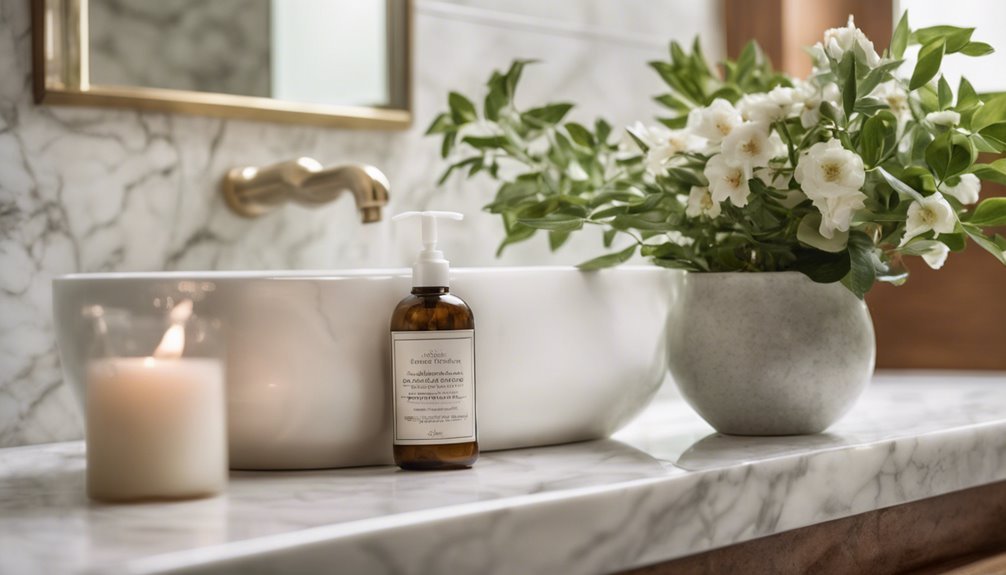
Moving on to the next step in your post-pregnancy skincare routine, it's essential to integrate nourishing moisturizers that deeply hydrate and repair your skin. After pregnancy, your skin might have gone through significant changes, including dryness and loss of elasticity. To combat these challenges, it's crucial to choose moisturizers rich in nourishing ingredients that enhance moisture retention.
A great moisturizer should not only hydrate but also support your skin's natural barrier. Look for products containing hyaluronic acid, ceramides, and natural oils such as jojoba or argan. These ingredients are key for locking in moisture and providing long-lasting hydration.
Here's a quick guide to help you choose the right moisturizer for your post-pregnancy skin:
| Ingredient | Benefits |
|---|---|
| Hyaluronic Acid | Enhances hydration, plumps the skin |
| Ceramides | Strengthens skin barrier |
| Jojoba Oil | Mimics natural skin oils, moisturizes |
| Argan Oil | Rich in Vitamin E, nourishes deeply |
| Glycerin | Attracts moisture to the skin |
Address Hyperpigmentation Issues
Hyperpigmentation can be a common concern post-pregnancy, often manifesting as dark spots or uneven skin tone. You're not alone in this, and there are safe, effective methods to address these changes and restore your skin's radiance.
To tackle hyperpigmentation, consider these scientifically-informed steps:
- Sun Protection: Always use a broad-spectrum sunscreen with at least SPF 30. UV exposure can worsen hyperpigmentation, making sun protection crucial for maintaining skin tone evenness.
- Topical Treatments: Look for products containing ingredients like vitamin C, niacinamide, or azelaic acid, which are known for their skin-brightening properties and can help in reducing the appearance of dark spots.
- Chemical Peels: Gentle peels containing glycolic or lactic acid can remove the outer layer of the skin, aiding in the lightening of hyperpigmentation. Ensure these are done under professional guidance.
- Consultation with a Dermatologist: For persistent hyperpigmentation, a dermatologist can offer treatments like laser therapy or prescribe stronger topical agents tailored to your specific skin needs.
Adopting these hyperpigmentation treatments will help you achieve greater skin tone evenness.
Manage Breakouts Effectively
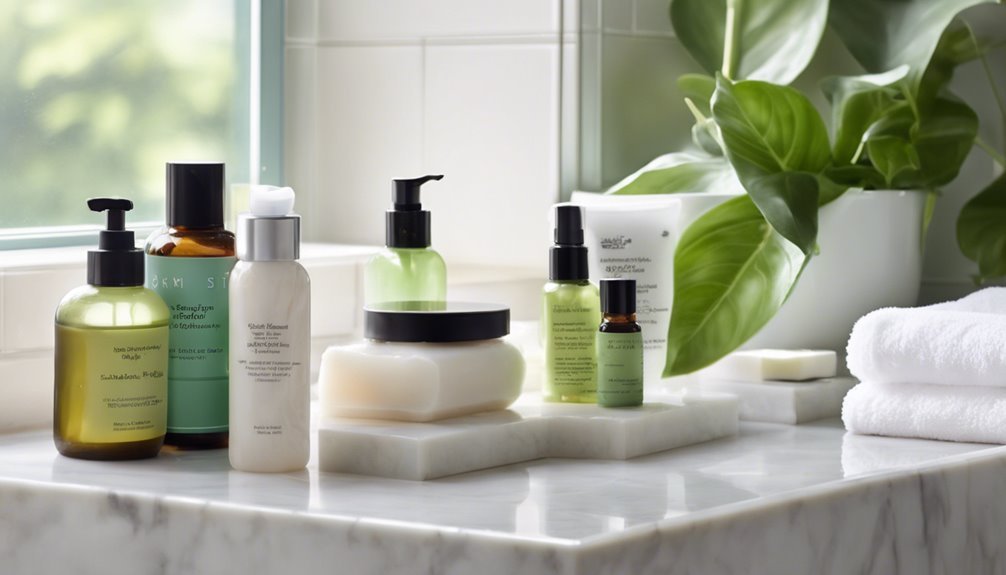
While hormonal fluctuations during and after pregnancy can lead to unexpected acne breakouts, it's crucial to manage these effectively to maintain clear skin.
Firstly, consider integrating a gentle cleanser with salicylic acid into your daily routine. This ingredient works deeply to unclog pores while remaining safe for use during post-pregnancy, especially if you're breastfeeding.
Next, spot treatment can be particularly effective. Look for products containing benzoyl peroxide or tea tree oil. These are powerful against acne but gentle enough not to irritate sensitive post-pregnancy skin. Apply directly to blemishes to reduce inflammation and bacteria without affecting surrounding skin.
To address acne scars, incorporate products with alpha hydroxy acids (AHAs) or vitamin C. These ingredients promote cell turnover and collagen production, aiding in the healing of scar tissue while brightening your overall complexion.
However, it's essential to start with lower concentrations to gauge skin sensitivity.
Incorporate Sun Protection
As you refine your post-pregnancy skincare routine, don't overlook the importance of incorporating sun protection. Exposure to the sun can accelerate skin aging and increase the risk of skin damage, which is why choosing the right sunscreen types and their daily application is crucial.
When selecting a sunscreen, it's essential to consider the following:
- Broad-spectrum protection: Look for products that offer protection against both UVA and UVB rays to shield your skin from the sun's full range of harmful effects.
- SPF rating: Choose a sunscreen with an SPF of at least 30. Higher SPF provides better protection but remember to reapply every two hours or after sweating or swimming.
- Safe ingredients: Opt for sunscreens with zinc oxide or titanium dioxide as they're less likely to cause skin irritation and are safe for sensitive post-pregnancy skin.
- Water resistance: If you're active or spend time swimming, consider a water-resistant formula to maintain effective sun protection even in wet conditions.
Make sunscreen a non-negotiable part of your daily skincare ritual.
Even on cloudy days or when indoors, UV rays can penetrate windows, making daily application just as important. Protecting your skin helps prevent future damage and maintains its health as you navigate the challenges of motherhood.
Utilize Soothing Ingredients
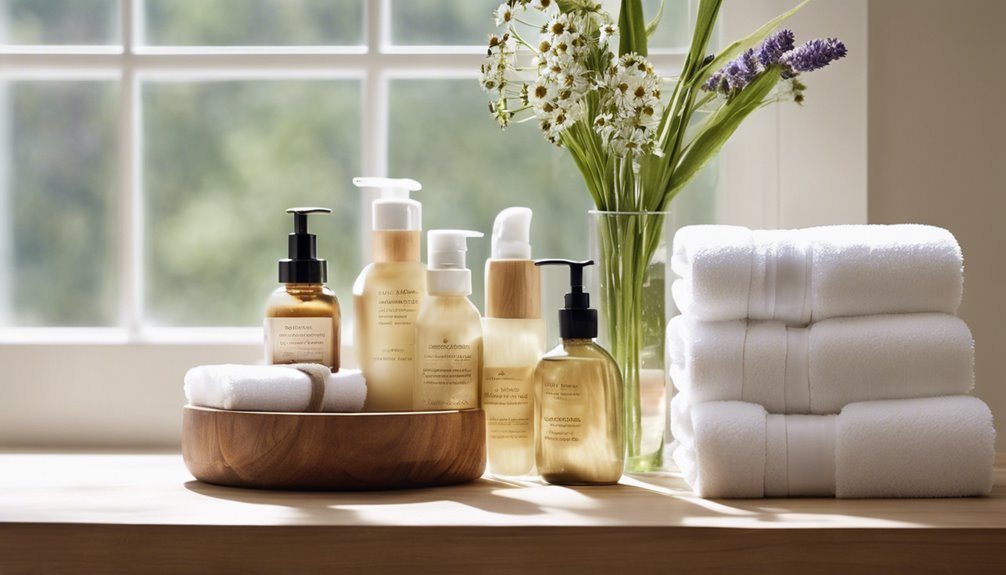
After the stresses of pregnancy and childbirth, your skin deserves gentle, restorative care. To soothe and replenish your skin, it's essential to incorporate ingredients that are both healing and calming. Calming botanicals and healing oils are superb choices, offering natural relief and support to your skin's recovery process.
Calming botanicals like chamomile and aloe vera provide soothing effects, reducing redness and irritation. These botanicals are known for their gentle properties, making them ideal for sensitive post-pregnancy skin. Similarly, healing oils such as rosehip and argan oil can profoundly nourish and repair your skin. They are rich in essential fatty acids and antioxidants, which help to restore elasticity and moisture balance.
Here's a quick guide to some key soothing ingredients:
| Ingredient | Benefits |
|---|---|
| Chamomile | Reduces skin irritation |
| Aloe Vera | Soothes and hydrates |
| Rosehip Oil | Promotes skin regeneration |
| Argan Oil | Enhances skin elasticity |
Incorporating these ingredients into your skincare routine can significantly enhance your skin's health, promoting healing and providing essential nourishment. Remember, your skin has gone through a lot; it's time to pamper and restore it with the utmost care and scientifically-backed, safe products.
Adjust Routine With Hormonal Changes
Post-pregnancy, your body undergoes numerous hormonal shifts that can significantly affect your skin's health and appearance.
These hormonal fluctuations can lead to a variety of skin issues, such as increased sensitivity, dryness, or oiliness. It's crucial to adjust your skincare routine to cater to these changes to maintain your skin's health effectively.
To help you navigate this transition, consider the following adjustments:
- Monitor your skin's response: Pay close attention to how your skin reacts to your current products. Increased skin sensitivity might require gentler formulations.
- Hydration is key: Ensure your products prioritize hydration to combat dryness that can be exacerbated by hormonal changes.
- Balancing act: If you're experiencing oilier skin, look for non-comedogenic products that balance oil production without over-drying.
- Seek professional advice: Consulting with a dermatologist can provide personalized insights based on the specific changes you're noticing.
Embrace Minimalist Skincare
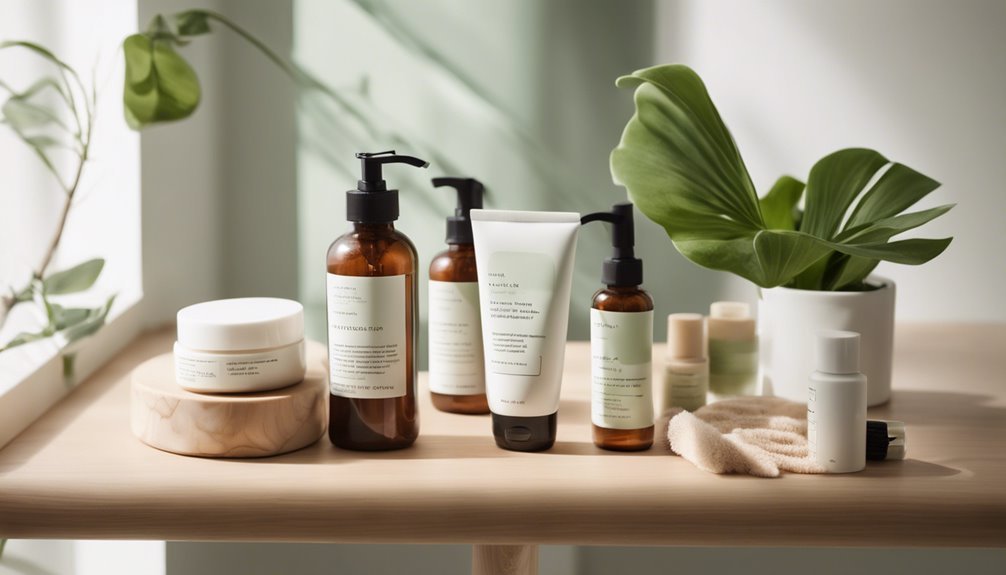
Understanding your skin's alterations due to hormonal changes helps you better tailor your skincare approach.
Post-pregnancy, your skin might react differently, and embracing a minimalist skincare routine can significantly benefit you. This means selecting simple products with natural ingredients that are gentle yet effective.
Opt for products that serve multiple purposes, such as a cleanser that also hydrates, reducing the number of items in your routine. This not only simplifies your skincare but also reduces the risk of irritation from excessive product use.
Look for ingredients like hyaluronic acid for hydration, niacinamide for controlling oil production and improving skin texture, and ceramides to strengthen the skin barrier. These are all safe and beneficial for post-pregnancy skin.
Regular Skin Assessments
Regular skin assessments are crucial as you navigate the post-pregnancy period. Your skin condition can vary significantly due to hormonal changes, and monitoring these shifts is key to adapting your skincare routine effectively.
You'll want to pay close attention to texture, color, hydration levels, and sensitivity. This vigilance ensures that you're not just guessing about what your skin needs but are making informed decisions that enhance your skin's health.
To effectively assess your skin, consider the following strategies:
- Daily Observation: Keep a close eye on any new changes or irritations that might appear.
- Monthly Check-Ins: Use this time to review if the products you're using are beneficial or need adjustments.
- Dermatologist Visits: Schedule regular appointments to get professional advice and potentially catch issues early.
- Product Testing: When introducing new products, test them on a small patch of skin first to see how your body reacts before applying more broadly.
These steps will help you maintain a proactive approach to your post-pregnancy skincare, ensuring you're using products that genuinely benefit your skin type and current condition.
Safety and efficacy should always guide your choices, helping you serve your skin's needs thoughtfully and effectively.
Frequently Asked Questions
Can I Use Anti-Aging Products While Breastfeeding?
You should be cautious when using anti-aging products while breastfeeding.
Some ingredients, such as retinoids and high-dose salicylic acid, aren't safe as they can pass into breast milk.
Opt for products labeled as safe for breastfeeding, focusing on those with hydration and mild exfoliation properties.
Always consult with your dermatologist to address your anti-aging concerns while ensuring the safety and well-being of both you and your baby during this sensitive period.
How Soon Postpartum Can I Start Exfoliating?
You can start exfoliating your postpartum skin as soon as your doctor clears you, typically around the six-week mark, if you've had a normal delivery.
It's crucial to choose gentle exfoliation methods to avoid irritating your skin, which may still be sensitive.
Look for products with natural exfoliants and avoid harsh chemicals.
Always patch-test new products to ensure they don't cause irritation, as your skin's sensitivity can increase after childbirth.
Are Facial Masks Safe for Post-Pregnancy Skin?
Yes, facial masks can be safe for post-pregnancy skin, but it's like walking a tightrope: you must carefully check the ingredients.
Avoid harsh chemicals that might irritate. Since your skin might be more sensitive now, opt for masks with soothing, natural components.
Always do a patch test first to see how your skin reacts. It's best to consult with a dermatologist to ensure the products you choose serve your skin's unique post-pregnancy needs.
Should I Avoid Makeup After Giving Birth?
You don't have to completely avoid makeup after giving birth, but you should be cautious about the ingredients.
Your skin might be more sensitive post-pregnancy, so opt for products labeled "non-comedogenic" or "hypoallergenic" to minimize risks.
Always patch test new products to check for adverse reactions.
Prioritizing gentle, safe formulations helps protect your skin while allowing you to enjoy makeup.
How Does Diet Impact Post-Pregnancy Skin Health?
Your diet after pregnancy affects your skin like water nourishes a wilting plant. Eating nutrient-rich foods boosts skin recovery by providing essential vitamins and minerals.
Hydration plays a crucial role, too; drinking plenty of water enhances skin elasticity and helps flush out toxins.
Focus on balanced meals and adequate fluid intake to support your skin's health. This approach not only benefits you but also sets a positive example for those you care for.
Conclusion
In the celestial journey of post-pregnancy life, your skin deserves nothing less than a throne. Envision wrapping it in a luxurious cloak of hydration and nourishment. Dive into a sea of gentle cleansers and emerge with skin that rivals the softness of a cloud. Let your radiant beauty be protected under an impenetrable shield of SPF, warding off the fiercest sun rays. Remember, embracing this transformative skincare odyssey isn't just care—it's an act of majestic self-love.




